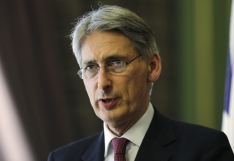
The former director of a private Muslim school in Birmingham has been funding militant Islamists in Iraq and Syria, the Daily Mail reported yesterday.
Until last year, Dr Nabil Al-Awadi, a naturalised Kuwaiti, had been living partly in Brixton, south London.
The Muslim cleric was director of Al-Birr Primary School in Nechells, Birmingham until February 2013.
Al-Awadi is now president of the Kuwait Scholars' Union, which has reportedly invested heavily in the Islamic State (IS) and other jihadist groups in Iraq and Syria.
He claims he is raising money for Kuwaiti charities to send aid to Syria.
Kuwait withdrew his citizenship in August, along with nine others associated with him, citing 'security reasons'.
Al-Birr School, which opened seven years ago, is reportedly linked to the Al-Muntada Trust, a large London mosque with attached schools, which has been accused of providing a platform for radical teaching.
In 2012, the trust held a conference where Al-Awadi spoke alongside Muhammad al-Arifi, a Muslim cleric who has since been banned from Britain.
As well as advocating other radical Sunni beliefs, Al-Arifi reportedly encouraged two young men from Cardiff to join IS. Nasser Muthana and Reyaad Khan, both 20, were featured in an IS propaganda video in June encouraging other Britons to fight for IS in Iraq and Syria.
The news of further British involvement in IS coincides with the Prime Minister's announcement today of a series of measures to prevent the return of British citizens who have fought for the Islamic State abroad.
On Friday the British terror threat had been raised to 'severe', acknowledging the danger of jihadists returning from fighting with the Islamic State and conducting acts of terror on British soil.
There are thought to be 500 Britons fighting for IS, and about half that number have already returned.
Temporary banning orders are likely, in order to prevent fighters returning to Britain. Removing the passports of Britons travelling to Iraq to fight is another option to be considered as the Conservatives debate the issue with Liberal Democrats.
The Labour Party and police have called for a return of some the measures developed under Tony Blair following 7/7 bombings, such as control orders, which allowed the authorities to interfere with the travel plans of suspected terrorists.
The Home Office already has the power to strip citizenship from those with naturalised status or dual citizenship. But removing citizenship from someone who has solely British nationality would render them stateless.
A YouGov poll found that 67 per cent of Britons think that the law should be changed to remove citizenship from those known to be fighting for IS.
But the Liberal Democrats have raised over the legality of some of the proposed measures.
Sir Edward Garnier QC, the former solicitor general and a Conservative MP, said that it would be difficult to "prevent lawfully a British citizen returning to their own country".
"What we have to do is balance what is the right thing to do – and there is an expectation the government should be doing more – against what is legally proper to do," he said in an interview with BBC Breakfast.
Some have argued that allowing suspected IS supporters to come back to Britain would mean they could be charged. But investigating acts of violence in a chaotic situation like that in Syria would likely be extremely difficult.
It has also been suggested that aid workers returning from places such as Iraq and Syria could also get caught in the anti-terror restrictions.



















